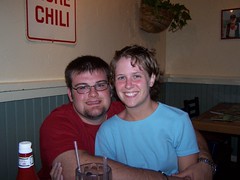Has fundamentalism come out of separation? Not in my tiny world of fundamentalism. But in my tiny world of fundamentalism, I see separation and political activity as two important issues within this movement. I say movement because fundamentalism is a movement. Even Ernest Pickering in his message at the 1969 GARBC Annual Conference in Fort Wayne, IN says this.
The remainder of this post is going to be attributed to this message. It has also been adapted and published in the February edition of the Baptist Bulletin. Click here to read this article.
I want to address an issue that I have seen and have heard comments preached from the pulpit at my bible college. A lot of times I hear terms that refer the fundamentalist churches to those who are comparable to Israel. As if the fundamentalist churches are just as important on a large scale as Israel. We are to "reach our own Jerusalem," we compare our battles to that of Israel and it frustrates me to think that we can align ourselves with Israel as if we are apart of the same family. I don't see this laid out in scripture. In fact there is a separation of us from Israel. We are not apart of the same family. We are not apart of the same promises. We are only apart of the same future; with Jesus forever.
So the message that Ernest Pickering preaches frustrates me. According to the printed version of this message, Pickering begins with comparing separatist fundamentalist generational struggle to that of Joshua's concerns with "God's chosen nation." In fact the Old Testament book of Joshua is used through out this entire message to show that separation is in fact what God wants from the church (a New Testament term). Now I understand that we can gain principles from the Old Testament, however I struggle with gaining a methodological outlook on a New Testament principle from an Old Testament context.
He states...
The key note of Joshua's address is found in the words, "Come not among these nations" (23:4, KJV). Israel was to have no spiritual fellowship with those who were walking in darkness and worshiping false deities. The command was specific and clear. God wanted His people to be separated.
God gave Israel land. There wasn't another world for them to even live in according to God. The land that they had possessed was theirs. Anybody that was not of them was to be driven out. That was to be their world that they could control. But Pickering tries to get "the church" to be "the true people of God" through this message. He uses this phrase twice saying that the "true people of God" are to "maintain the principle of complete separation from [interfaith worship] confusion" and that Joshua warned that idol worship will weaken the "true people of God." It is white noise to my ears to consider myself the "true people of God" because I am in the family of God. I am an heir and I am not just a "person." A "people" then is a nation or group of people that have first place. Israel are these people and they have first place in the eyes of God. Before I was saved, there was Israel and after I die, there will be Israel.
Now, Pickering goes on saying,
It is interesting to see that Joshua placed some emphasis upon the importance of the home in maintaining a strong stand for Jehovah God. He warned that Israelites were not to "make marriages with them," that is, with the heathen peoples who lived around them. The strength of the nation was measured by the strength of its homes.
The stand of our churches will be only as strong as the stand of its homes. We cannot expect to have churches that are strong in their separated position if the homes that compromise those churches are weak and worldly. To this end we must guard against any deterioration of our position on personal separation from the world. A church whose homes are in fellowship with the world cannot maintain itself as a separated testimony from the world.

No comments:
Post a Comment